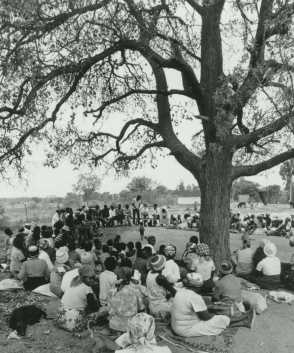Possibilities for follow-up are good but cannot be assured. That isthe structure of padare; a place to provide encounters with newness ofsharing and uniqueness of exchange.
Padare is about consensus through open dialogue and mutual respect. Dare is the traditional Shona term which denotes the special meeting placewhich, before colonialism, functioned at many levels of Zimbabwean society.

Padare
(a Zimbabwean word meaning "meeting place")
Women within a family also met together, but in a different place tothe men. They called their meetings kutandare. At the village level the padare was also a mainly male grouping. Here,it provided community building, counseling of the young, and judicial decisionsin the face of disputes.
The gender-specific character of these groups is not something thatone would normally consider desirable today. However, there are other aspectsto the Shona tradition of padare which Zimbabweans are currently re-evaluatingand reclaiming.